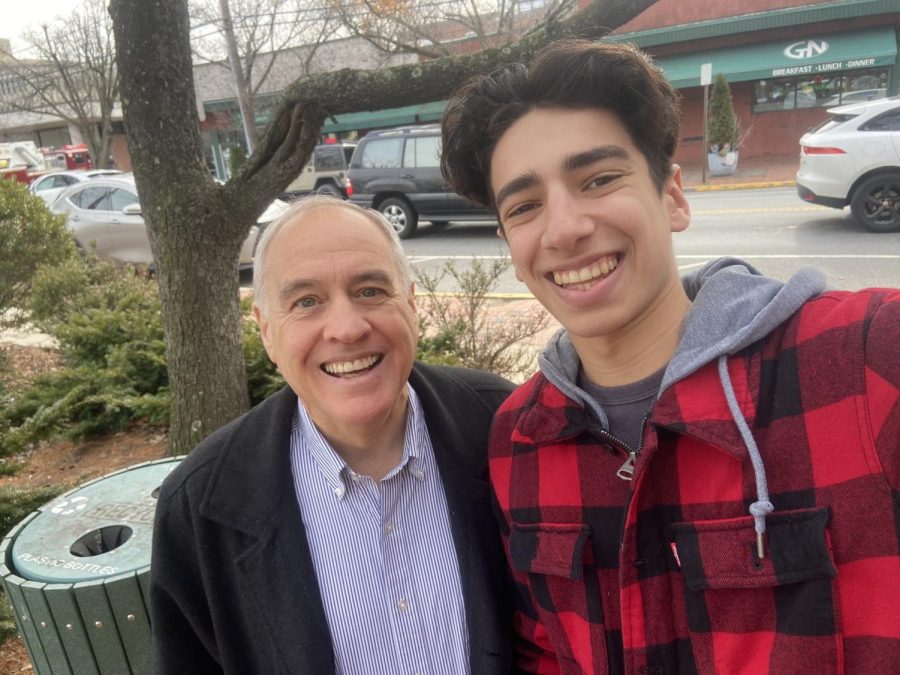DiNapoli Diner Discussion: A Conversation with the Comptroller
March 25, 2023
Thomas P. DiNapoli is responsible for managing over $240 billion in New York State assets and providing financial security to over one million New Yorkers. Many know the DiNapoli name. Some know the face. But who exactly is this man? My breakfast with Tom DiNapoli on a Saturday morning in February was my chance to answer these questions, and more. What I wound up learning that morning enlightened me, and instilled a profound respect for a man of integrity that has climbed to the highest ranks of public service, and has performed for over 35 years on one of the greatest stages—New York State.
DiNapoli, a lifelong Long Islander, was born in Albertson, but grew up in Mineola, where he ran to serve as a trustee on the Mineola School Board at just eighteen years old. The year was 1972, and an unsuspecting incumbent—Bernard Zinober—was flat-out beaten by DiNapoli, a Mineola High School senior. The win made DiNapoli the youngest person in New York State history to take public office. Despite his early success in politics, DiNapoli knew that a formal education was necessary to propel him to greater heights.
A child of a working-class family in a union household, DiNapoli stayed local for college. He attended Hofstra University as a history major and graduated Magna Cum Laude in 1976. One year before graduating, DiNapoli ran for Town of North Hempstead Council but lost.
After graduating from Hofstra, DiNapoli found employment as a manager at AT&T, where he worked for ten years. While at AT&T, DiNapoli’s passion for politics continued to burn. In 1982, after resigning from the Mineola School Board, DiNapoli ran for Town of North Hempstead Supervisor against John Kaiman, who was ultimately re-elected that year.
In 1982, DiNapoli attended The New School in New York City and earned a degree in management and urban design. Four years later in 1986, DiNapoli, then 31, ran against Eric Engelhardt for the New York State Assembly, won the election, and resigned from his managerial position at AT&T. As an Assemblyman representing the 16th District in northwestern Nassau (which includes Great Neck), DiNapoli made impressive strides over 20 years, including serving as the Chair of the Governmental Operations Committee from 1995-2000, the Local Governments Committee from 2000-2002, and the Environmental Conservation Committee from 2002-2007.
In 2007, New York State Comptroller Alan Hevesi resigned in disgrace after being convicted of fraud for, among other things, using state-issued vehicles for personal matters. At the time, DiNapoli was serving his eleventh consecutive term as assemblyman in the Legislature. As Comptroller, DiNapoli immediately established a committee to review and reform the Comptroller’s office. Just months after the appointment, DiNapoli also boldly contested then-Governor Spitzer’s proposed budget, which the former warned was unsustainable. DiNapoli was re-elected as New York State Comptroller in 2010, 2014, 2018, and 2022.
My breakfast with DiNapoli was at the Great Neck Diner, which is just a few blocks away from where he lives on Great Neck Road. It was a brisk Saturday morning around 10 AM. DiNapoli walked from home and entered the diner in an unassuming manner and greeted me with a big smile and handshake. Over scrambled egg sandwiches, we discussed everything from his time running for the Mineola School Board as a teenager, to his recent reelection to a fifth term as New York State Comptroller. Throughout the course of our meal, DiNapoli handled a steady flow of approaches by friends and supporters (who obviously had little regard for the fact that an interview for The Southerner was taking place). DiNapoli shook the hands of each and every person, and he seemed to appreciate them just as they appreciate him.
LG: Where did you grow up? What was your childhood like?
TD: I’ve lived on Long Island all my life. I was born in Albertson, but my family moved to Mineola when I was young. My dad worked at a phone company, and my mom was a secretary for the NYPD. I grew up in a union household with immigrant grandparents, so I think that definitely had an impact on my perspective of life.
LG: What motivated you to run for Mineola School Board at such an early age? Would you say that your family/background played a role?
TD: I think the biggest factor that pushed me to run was the time period itself. During this time, the 60s and 70s, the biggest concern was the Vietnam war, and especially among young people because of the draft. Different movements started to pop up around this time too, like the civil rights movement, anti-war movement, and the women’s rights movement. The age to vote and run for school board at the time was 21, and it wasn’t until I turned eighteen during my senior year that they lowered both the voting age and the running age to eighteen too. I saw it as a perfect opportunity to get involved, so I did. I was also a Mineola high schooler, and didn’t like some of the things that I was seeing, so I wanted to change them.
LG: Did you think that you would win?
TD: Truthfully, I wasn’t really sure. It all started, more or less, as a fun little senior year project for me and my friends. We really went all out for it, though. We had fliers made, and as the election neared we were even going door to door to gain support. I think the election was on May 3rd [1972], and I remember being so scared that no one would come out to vote because it was raining that day.
LG: How did you decide to major in history at Hofstra, and how did you manage to graduate magna cum laude while continuing to serve on the school board?
TD: My father always pushed me to go to law school, and history is a good undergraduate major for that sort of thing. I was never too keen on going to law school, and I’ve always been interested in reading about people and their accomplishments or their contributions to the world. I would’ve studied political science, but it was a bit too logistical for me with all of the data analysis and whatnot. I found that I enjoyed and performed well in history, so balancing my work at Hofstra with my work on the school board was never too strenuous. I just kept my head down and did my work, and I guess that I did it pretty well.
LG: Was there still a push from your father for law school after graduating from Hofstra?
TD: Oh, yes. There were always pushes and strong opinions from my parents concerning my career choices. I actually did end up applying to law school after graduating from Hofstra and I got accepted, but I chose to defer my acceptance for a year.
LG: You ran for town supervisor in 1975, while you were still in college and serving on the Mineola School Board. How did this loss affect you, and how would things be different if you had won?
TD: I’ve never been a person who agonizes over losses or things that don’t go my way. I try things that I want to do and if they work out, great, but if not, that’s okay. However, I do think that my career would have turned out much different if I did win, either in ‘75 or ‘82. If I had won, I would be retired by now. A lot in life is just luck and circumstance, at least that’s how it’s been for me in my career. Not to say that hard work isn’t a factor, because it certainly is, but I look back on my career and see that things would be very different if I had made, or not made, certain decisions along the way.
LG: What led you to find employment at AT&T? Did you like the job?
TD: I needed to find a job after college, and I went to work at AT&T as a telephone operator thinking that I’d only stay there a couple years. But I was offered entry into a sort of management-training program a short while into my time there. I accepted, and became a manager at AT&T when I finished the program. As manager, I was doing budget, management, staffing, that sort of thing. I really enjoyed it, actually. I liked running the office and talking to people; I really committed myself to the corporate world.
LG: How did you decide to run for NYS Assemblyman in 1986? At this time you were 31 and well into your career at AT&T; why make the switch?
TD: I just saw it as an opportunity and decided to go for it. Being in the corporate world at AT&T was always something I enjoyed, but public service is what I wanted to do from the very beginning. It definitely was a big career change, but it’s one that I’m extremely happy I made.
LG: What was the transition from AT&T to state government like?
TD: Working at AT&T, I was very used to working in a corporation. Everything was always very organized and concrete. If you had a problem or question, you knew right who to go to. In government, I found that there weren’t any explicit rules to play by; there were a lot of unknowns. My first year as assemblyman, I felt very out of place, but I became acclimated and got into the swing of things. The position actually came to mean a lot to me. I was representing the same district that I grew up in, so I had close relationships with a lot of the people back there. The ability to make and see change in my hometown was very rewarding. Although I always liked fighting for issues and introducing bills, I always felt like I needed something more.
LG: Did that “something more” end up being the Comptroller position?
TD: I didn’t know it at the time, but yes.
LG: How did you decide to make the switch from Assemblyman to Comptroller?
TD: It just seemed like a logical career change at the time. For 20 years I was in the legislature representing only people in my district of Long Island, so I wanted to move on and represent NYS as a whole.
LG: The circumstances of your entry into the position were not great due to the actions of your predecessor, Hevesi. Did you feel the effects of that controversy?
TD: Oh, absolutely. For months I was scared to use state-issued cars. I told everyone that I’d drive myself, or walk. I live down by the capital at Albany, and everybody would always say I was crazy for not using state cars to get to meetings or hearings. It wasn’t until I received a death-threat letter that contained a suspicious white powder–that turned out to be Splenda–that I began using the state cars. I remember that night well actually, Spitzer, who was governor at the time, invited me to his house. He told me that for my own good, I’d better start riding in state-issued vehicles.
LG: Wasn’t there tension between you and Spitzer at this time?
TD: Yes, and a good amount of it too. We shared different views on the NYS budget, and I thought that his proposed plan wouldn’t work out, so I said that. I guess he decided to put our differences aside when the whole death-threat incident occurred.
LG: Did you ever find out who it was that sent you the death threat?
TD: There was a whole investigation that was conducted. Turns out that it was actually a patient from a nearby mental institution. After that whole incident, I was pretty much required to start riding in state vehicles. It was definitely an interesting moment in my career. I think about it often.
LG: Are there other moments/accomplishments that you often find yourself thinking about?
TD: The pension fund is definitely one of my biggest accomplishments. NYS has the third biggest pension fund behind California, which actually has two. The ability for me to maintain it, especially over all these years, is something I’m proud of. The investments we’ve made with the fund are extremely diverse and they aim to help all New Yorkers. We have a mix of investments in Northern Ireland, Starbucks, organizations like the LGBTQ+ community, and we even have a special initiative on disability corporations. On top of the work I’ve done for NY, I’m also proud of the reputation I’ve managed to maintain over the years. Politics is rough, and I know that there are people who disagree with me, but I haven’t given people a reason not to like me, not yet at least.
LG: Is there anything in your career that you would change?
TD: Not really. Like I said before, I’m not one to dwell on the past for too long. I am basically happy so I don’t really think about that. If I had to change something, I would have gotten another degree along the way; whether it was a law degree or a PhD, I think it would have been fun to do.
LG: How long do you plan to remain in your position as Comptroller? Would you ever run for any other position?
TD: For now, I am just focusing on the next four years to come. I do not plan to run for governor or become a congressman if that’s what you’re asking. Politics is crazy enough on the state level, and it’s crazier than ever on the federal level right now. I’m not really one of those people who envisions bigger as better; I’m happy where I am, so I’m going to stay here.







